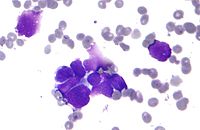
Photo from wikipedia
Abstract The treatment of childhood cancer with chemotherapy drugs can result in infertility in adulthood. Newer generations of drugs are developed to replace parent drugs, with the potential benefits of… Click to show full abstract
Abstract The treatment of childhood cancer with chemotherapy drugs can result in infertility in adulthood. Newer generations of drugs are developed to replace parent drugs, with the potential benefits of less toxic side effects. For platinum alkylating-like drugs, in contrast to the parent compound cisplatin, the newer-generation drug carboplatin is reported to have reduced toxicity in some respects, despite being administered at 5–15 times higher than the cisplatin dose. Whether carboplatin is also less toxic than cisplatin to the reproductive system is unknown. Here we compare the gonadotoxic impact of cisplatin and carboplatin on female and male mouse prepubertal gonads. In vitro cultured CD1 mouse ovaries or testis fragments were exposed to either cisplatin or carboplatin for 24 h on Day 2 of culture and analysed by Day 6. A dose response for each drug was determined for the ovary (0.5, 1 & 5 μg/ml cisplatin and 1, 5 & 10 μg/ml carboplatin) and the testis (0.01, 0.05 & 0.1 μg/ml cisplatin and 0.1, 0.5 & 1 μg/ml carboplatin). For the ovary, unhealthy follicles were evident from 1 μg/ml cisplatin (73% unhealthy, P = 0.001) and 5 μg/ml carboplatin (84% unhealthy, P = 0.001), with a concomitant reduction in follicle number (P = 0.001). For the testis, the proliferating germ cell population was significantly reduced from 0.05 μg/ml cisplatin (73% reduction, P = 0.001) and 0.5 μg/ml carboplatin (75% reduction, P = 0.001), with no significant impact on the Sertoli cell population. Overall, results from this in vitro animal model study indicate that, at patient equivalent concentrations, carboplatin is no less gonadotoxic than cisplatin.
Journal Title: Molecular Human Reproduction
Year Published: 2020
Link to full text (if available)
Share on Social Media: Sign Up to like & get
recommendations!